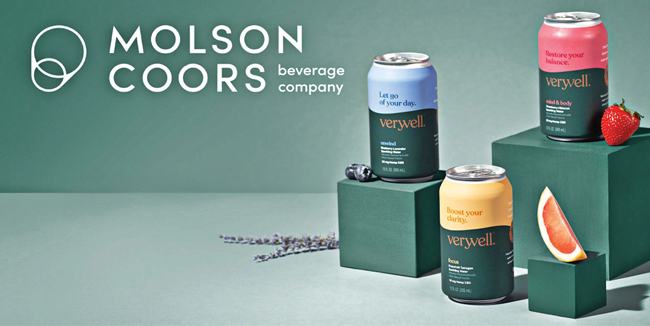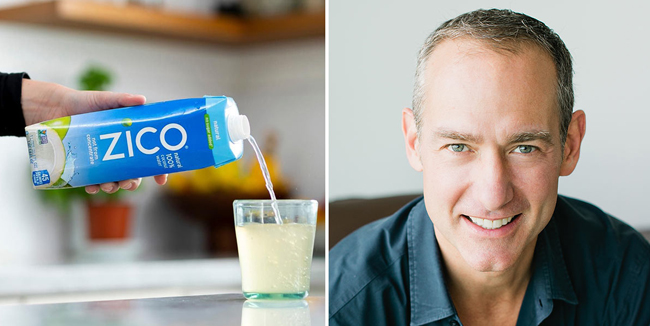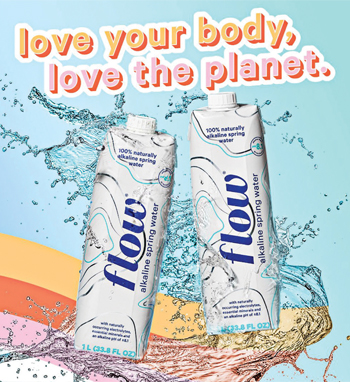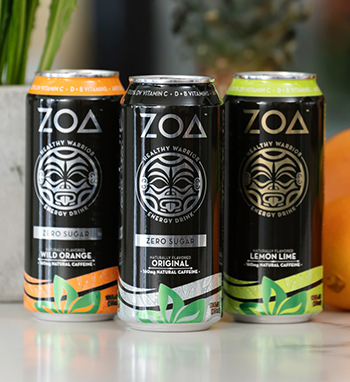Bevscape: The Latest Beverage Brand News
Miller Coors Launches Its First U.S. CBD Drink in Colorado
Beer giant Molson Coors is continuing its push into non-alcoholic beverage categories with the U.S. launch of Veryvell, a line of sparkling CBD-infused drinks available exclusively in Colorado.
Available in three varieties, Veryvell is a zero-sugar flavored sparkling water that includes 20mg of hemp-derived CBD per 12 oz. can. Each SKU also contains adaptogenic herbs for additional functionality: Focus (grapefruit and tarragon flavor) contains ginseng and guarana; Mind & Body (strawberry and hibiscus) has ashwagandha and elderberry; and Unwind (blueberry and lavender) features ashwagandha and L-theanine.
Veryvell is the first product release for Truss CBD USA, a joint venture between Molson Coors, also the majority owner, and Canadian cannabis manufacturer HEXO. Launched in April, Truss CBD USA operates as an independent company with its own board of directors, management and resources, with a remit to develop, manufacture and distribute infused products within the state of Colorado.
Molson Coors formed a similar partnership with HEXO to develop cannabis drinks for the Canadian market in August 2018. Veryvell debuted in Canada last year, though the formulations for those products also contain THC.
Though limited to distribution in a single state, the launch of Veryvell represents another piece in Molson Coors’ strategy to expand its beverage interests outside of beer, including through distributing products in categories like hard seltzer (Topo Chico) and ready-to-drink coffee (La Colombe). Earlier in January, the company announced it was partnering with a group led by actor Dwayne Johnson to manufacture and distribute ZOA, a natural energy drink.
“Last year, we redefined ourselves as Molson Coors Beverage Company and in doing so, laid out a clear vision of leveraging the competitive strengths of our storied foundation in beer to grow in new spaces beyond the beer aisle,” said Pete Marino, president of the emerging growth division for Molson Coors, in a press release. “Truss’ entry into the CBD market in Colorado and the launch of Veryvell, a brand we believe will resonate well with Colorado consumers, is another example of Molson Coors’ expansion into new beverage categories.”
Veryvell is available now in Colorado both from the brand’s website and at select retail stores in the state, where it is offered in individual 12 oz cans (MSRP $3.99) and 4-packs ($14.99). The brand is also offering 8-packs and 12-count variety packs exclusively online.
According to cannabis market research firm Brightfield Group, the U.S. CBD beverage market was worth $143.1 million in 2019. Colorado ranks 10th in the country in terms of CBD beverage consumers by state, representing 2.9% of overall U.S. users.
Speaking with BevNET in January, Marino said that Colorado’s mature and regulated marketplace for infused products presented the ideal conditions for Molson Coors to make its initial foray into CBD drinks. The company also owns its distribution arm in the state, Coors Distributing Company, giving it further control over Veryvell’s route to market.
Truss CBD USA will explore taking the brand into other regulated markets in other states based on its performance over the first few months of 2021, Marino said, as Molson Coors seeks to ramp up the pace of its expansion into wine and spirits, cannabis-infused beverages and non-alcoholic drinks.
Chobani Enters RTD Coffee Category With Multi-Serve Cold Brews
Just over a month after it released a slate of new innovations across several product categories, Chobani’s platform expansion continued in January as the Greek yogurt maker revealed a new line of ready-to-drink cold brew coffees.
Chobani Coffee entered stores nationwide in January, where it will be available in 32 oz. multi-serve Tetra Top cartons in four varieties: Cold Brew with Sweet Cream, Cold Brew with Vanilla, Cold Brew with Oatmilk and Cold Brew Pure Black. Each contains about 85mg of caffeine per serving and has a suggested retail price of $4.49.
Over the past year, the Norwich, New York-based company has rolled out a steady stream of beverage innovations, including oat milk, probiotic drinks and creamers. In December 2020, the company introduced Chobani Probiotics, a line of drinkable yogurts and yogurt cups with added gut health benefits, a zero-sugar oat milk and two new creamer flavors.
The launch of Chobani Coffee represents the company deeping its investment in refrigerated products that “have a relationship with coffee” and which can highlight its expertise in dairy and plant-based dairy alternatives, according to Neil Sandfort, chief innovation officer at Chobani.
The line was also appealing because it can utilize two ingredients Chobani has plenty of at its Twin Falls, Idaho production facility plant in Twin Falls, Idaho: cream (a byproduct of making yogurt) and oat milk.
“I can’t think of many places that have fresh cream on hand, have oat milk on hand, and in the same factory can bring this all together with coffee,” he said. “We can really crank up the quality because we’re holding all of these parts (versus co-packing). Of course there’s efficiency in that, so we can make this really high quality product accessible.”
The coffee itself is made from single origin 100% Arabica beans and is described in press materials as a “cold-press brew.” Coffee roaster and retailer La Colombe, of which Chobani owner/founder/CEO Hamdi Ulukaya is the majority owner, uses similar language on its RTD products. Chobani, however, did not disclose the source of its coffee.
According to Nielsen data, dollar sales in the refrigerated RTD coffee category have grown 30% over the 52-week period ended on October 26, 2020. PepsiCo’s North American Coffee Partnership with Starbucks led the way with 47.1% sales growth ($141.8 million), followed by Danone (+46.3% to $106.2 million).
Relative to its competitors in coffee, Sandfort said Chobani’s proposition will be about “simplicity and quality.”
“Like most spaces in the supermarket, it’s a category that is condensed down and is oligopolistic and there’s typically two or three major players that have been there for a while with the lion’s share of the market,” he said. “That’s a familiar model, and typically what that means is there’s an opportunity for brands like us to come in and reconcile some of the disconnect between what they are offering and what the consumer thinks they are buying.”
Zico Returns as Founder Rampolla, PowerPlant Ventures Buys Brand
After Mark Rampolla sold his coconut water brand Zico to The Coca-Cola Company in 2013, he wrote a book, “High Hanging Fruit,” which chronicled his journey from bootstrapping the brand and building the category up to its eventual sale to the country’s largest beverage company.
But the story is not done yet: over a decade later, Rampolla finds himself writing the next chapter in Zico’s history, having reacquired the brand from Coca-Cola in January via investment fund PowerPlant Ventures, of which he is a partner and
co-founder.
“It’s surreal,” Rampolla told BevNET in January. “Very few times in one’s life do you get a chance to do something again like this, so I’m viewing it as something I’m doing both for the brand and for my family. One of the things I might have missed out on, I now get to do again.”
At the time of Zico’s initial sale to Coke, the soda giant looked set to turn coconut water from a small but expanding category into an explosive growth driver that would help pivot the company into other natural, better-for-you refreshment drinks. To a certain extent, the partnership was a success, bringing Zico into new formats, flavors and retail channels as one of the leading brands in the coconut water category. But, amidst declining sales and the desire to trim a bloated portfolio of underperforming products, Zico was one of 200 global brands that were discontinued — along with Odwalla, Tab and others — as part of a mass culling at Coke in October.
Though Rampolla, who launched Zico in 2004, admits to thinking there was always the “crazy possibility” that he might one day reacquire the brand, he only began exploring the opportunity of buying the brand once Coke’s decision was made. Upon agreeing with partner Dan Gluck that it was worth considering, Rampolla said the fund completed the same rigorous underwriting and vetting process that it would any other potential investment. At the same time, Coca-Cola was running its own due diligence and considering offers from other suitors as well. When it came time to make a decision, Rampolla excused himself from the final vote to ensure the choice was driven by the business opportunity rather than emotion.
“Having gone through that whole process, what we concluded was that coconut water is still a large category,” he said. “Growth had been a little challenged recently, predominantly because Coke and Pepsi were not giving it the attention it needed. We felt like that could be corrected, and we found that consumers are still interested in coconut water.”
Reflecting on what might have arrested Zico’s expected growth under Coke, Rampolla noted that it struggled to stand out when compared to other high-revenue brands. In the years since acquiring Zico, the soda giant has also revamped its Venturing and Emerging Brands (VEB) division to focus on investing in larger, more mature companies rather than early-stage startups.
According to market research group SPINS, total U.S. coconut water dollar sales in MULO plus convenience and natural and enhanced channels was down 4.4% year-over-year through June.
“As best as we can tell, Coke did a good job of keeping the product integrity and the quality,” he said. “I think they struggled with execution. It’s hard in a system that big to get much attention when a brand is anything less than $500 million in revenue.”
Despite using a new name, Zico Rising, the product will essentially be the same one that consumers have grown familiar with during its time in the Coke portfolio. Having done a deal for only the brand assets and not the business itself, Rampolla said the company is working, with support from Coke, to reestablish its supply chain and re-engage with retailers and consumers ahead of hitting store shelves at some point in Q1, with production expected to begin “within days or weeks.”
“It will be exactly the same product, exactly the same brand, the same look and feel,” he said. “Everything will be the same.”
From that starting point, however, Zico Rising is set to take a different approach to product development from its time at Coke. Rampolla said the brand will be put through a “pretty brutal” SKU rationalization that will bring the focus back on the pure coconut water product, before rebuilding an innovation pipeline that “brings some energy, excitement and relevance” back to the category. To that end, he noted that 2021 will be a “learning year” for the company as it engages with consumers, retailers and commercial partners to frame how coconut water fits into the ever-expanding range of plant-based waters and natural hydration beverages, a space it helped pioneer over a decade ago.
Even though Zico is back with its original founder, Rampolla emphasized that the company will be treated the same as any other brand in PowerPlant’s portfolio, with former Naked Juice CEO Tom Hicks running the company and building out the team. Rampolla will serve as the chairman of the company’s board of directors; he is also on the board of seven other PowerPlant portfolio ventures.
Having done so once already, though, Rampolla didn’t dismiss the idea of Zico potentially making a second exit to a large strategic, or other interested buyer, at some point in
the future.
“It’s certainly possible that it ends up back in a strategic’s portfolio, but it’s also possible that it’s a standalone brand, or as part of a portfolio of a public company,” he said. “Our goal is to build an amazing brand and company and culture that can live forever; if we can do that, the rest will take care of itself. And I really mean that — there’s no specific objective here other than to have some fun, build something great and create some value for everyone that is associated with it.”
Despite the brand’s decline under Coke management, in hindsight, Rampolla said the decision to sell Zico in the first place was still the right choice at the time.
“My wife has a background in public health, and she always said she could never imagine a bigger public health coup than helping Coca-Cola sell something healthy around the world,” he said. “That was our vision, we stuck to it and we feel very fortunate to have made that happen.”
Flow Alkaline Water Set to Go Public
Flow Alkaline Spring Water will go public this spring on the Toronto Stock Exchange (TSX) as the Toronto-based beverage company plans a reverse merger with an initial public offering (IPO) that aims to raise $50 million.
The announcement comes as the six-year-old brand seeks to double its U.S. footprint over the next 18 months. According to Flow founder and CEO Nicholas Reichenbach, the company expects to begin trading in April or May and is planning a secondary offering on NASDAQ within the next 12 months.
Reichenbach said the company was inspired to take the public route after Beyond Meat’s 2019 IPO showed an avenue for better-for-you food and beverage companies on the stock market. He noted that Flow’s focus on environmental sustainability (the drinks are packaged in Tetra-Pak containers) positions it as a high-growth, better-for-you brand.
“[Beyond Meat was] when you started to see healthy institutional capital come into the market with a 10 to 15 year hold,” Reichenbach said. “And what that does is it gives a really good platform for companies like Flow to really access institutional growth capital that has a mid to long term view on the company’s growth, which really gives the runway for us to take a incredible leap forward as a company.”
By going public, Reichenbach said Flow could potentially achieve a 5-to-7.5x investment multiple, versus a 1.5-3.5x multiple through a more common private equity-to-exit strategy. The move will also allow him to stay on as CEO for the foreseeable future, he added.
“I intend to stay till the very end,” he said. “I think we can take this all the way. It’s a very rare thing in this industry — it’s a unicorn for sure — where you can take a company and have a long term 10-20 year vision on it. And that’s what going public is to me as an entrepreneur.”
Flow is currently available in over 30,000 doors in the U.S. and Canada, with much of its sales coming in the natural and specialty channels. Points of distribution have increased roughly 75% over the last three months. In January, Flow chief revenue officer Tim Dwyer told BevNET that the company aims to have 65% ACV in the grocery channel by next year. The company grew sales 44% last year to over $25 million and ecommerce sales increased over 200% to represent over 20% of Flow’s total sales.
According to Reichebach, Flow owns over $100 million in assets, including two artesian springs — one in Canada and another in Virginia. Through those facilities, the company also operates its subsidiary Planet A Co-Packing Solutions which produces products for companies including Vita Coco and Orro among others. Reichenbach said that Flow expects to produce over 100 million units this year.
Last year, Flow raised $45 million in a Series D funding round that included backing from celebrity investors including rapper Post Malone, Shawn Mendes and MLB champion Chase Utley. Reichenbach noted that Flow’s influencer roster has helped grow its consumer base to over 17 million and the company expects to double that this year.
“We can take this company to a multi-billion-dollar revenue stream,” Reichenbach said. “When you look within the premium enhanced water category globally, it’s growing at double digits every year. So from a category perspective, we could sit in this path for years as we capture market share and grow to be the number one premium enhanced mineral water in North America.”
Molson Coors Partners With Dwayne Johnson to Launch ZOA Energy Drink
As it continues to develop new non-alcoholic brands in a myriad of categories, the Molson Coors Beverage Company announced in January that it will enter the energy space with ZOA, a new better-for-you energy drink co-founded by actor Dwayne Johnson.
Set to launch in March, ZOA was founded by a team including Johnson, The Garcia Companies and TGC Management CEO Dany Garcia, fitness coach Dave Rienzi and Juggernaut Capital Partners managing partner John Shulman. This is the first founding venture into CPG for Garcia, who is a regular business partner of Johnson — with whom she co-owns the XFL football league — as well as for her husband Rienzi, who owns Rienzi Strength & Conditioning.
Each 16 oz. can of ZOA contains 160 mg of caffeine sourced from green tea and unroasted coffee, added electrolytes and amino acids, superfood ingredients such as turmeric, camu camu and acerola and vitamins B, C and D.
According to Shulman, the founding team came together following Johnson and Garcia’s own investments in VOSS Water, in which Juggernaut Capital is a partial owner. Shulman said the group wanted to launch a new product together and, encouraged by internal data, felt there was a “void” in the energy space for a health-focused brand.
The past several years have seen spikes in energy drink growth, driven by a cohort of fitness energy beverages such as Bang, CELSIUS and C4. The category was up 7.8% to $14.1 billion for the 52-week period ending December 26, according to Nielsen.
Shulman said that in addition to riding momentum in the energy category, ZOA will also play towards the growing trend for immunity beverages. In September, Johnson publicly announced that he and his family had been diagnosed with COVID-19 and had begun taking a number of immunity-boosting supplements. This development inspired the brand to reformulate the product with some of these ingredients and integrate immunity into the messaging, Shulman said.
While Johnson himself — recently dubbed by website The Profile as the ‘Most Likeable Person in the World’ — and his public platform (211 million followers on Instagram) will play a key role in early marketing for ZOA, Shulman said the company does not want the brand to appear as just another celebrity beverage play. Much of the messaging will be tailored towards health and wellness, particularly the drink’s vitamin content.
ZOA was introduced to Molson Coors through its partner company L.A. Libations and has taken an equity stake in the brand, in addition to acting as its exclusive distribution partner.
According to Pete Marino, president of emerging growth at Molson Coors who serves as the head of non-alcoholic beverage, the conglomerate wanted a player in the energy category in part due to existing synergies with its beer business. He noted that the company’s DSD distributors have past experience servicing energy brands while the category largely thrives in the convenience channel — a space it is familiar with.
“We think a healthier energy or performance beverage has a lot of potential and I think that potential has strengthened coming out of the coronavirus, where consumers are continuing to look for better-for-you products,” Marino said. “So the fact that this is a more positive, healthier energy and performance beverage, is something that makes it really, really exciting and appealing to us.”
ZOA will first be available online, but Molson Coors and L.A. Libations are currently meeting with top U.S. retail chains in preparation for a nationwide launch in March, Marino said. The brand will take an omnichannel strategy and although convenience, grocery and drug will be key focuses Marino said he sees opportunity for ZOA to enter the natural and specialty channel as well.


Receive your free magazine!
Join thousands of other food and beverage professionals who utilize BevNET Magazine to stay up-to-date on current trends and news within the food and beverage world.
Receive your free copy of the magazine 6x per year in digital or print and utilize insights on consumer behavior, brand growth, category volume, and trend forecasting.
Subscribe



